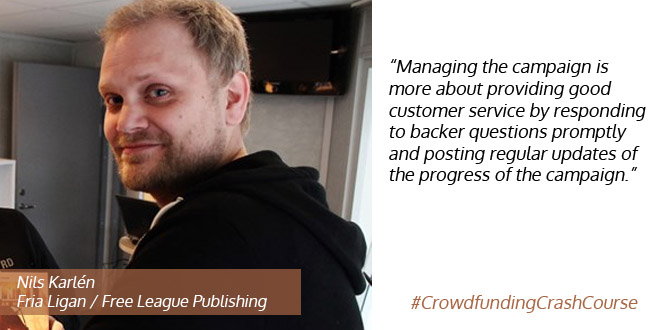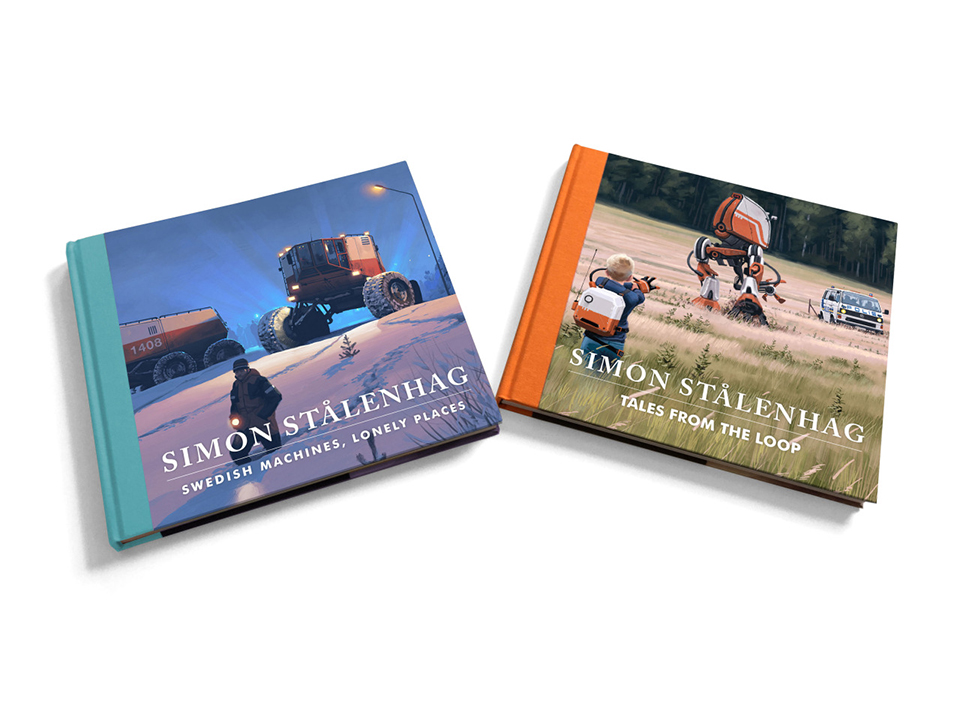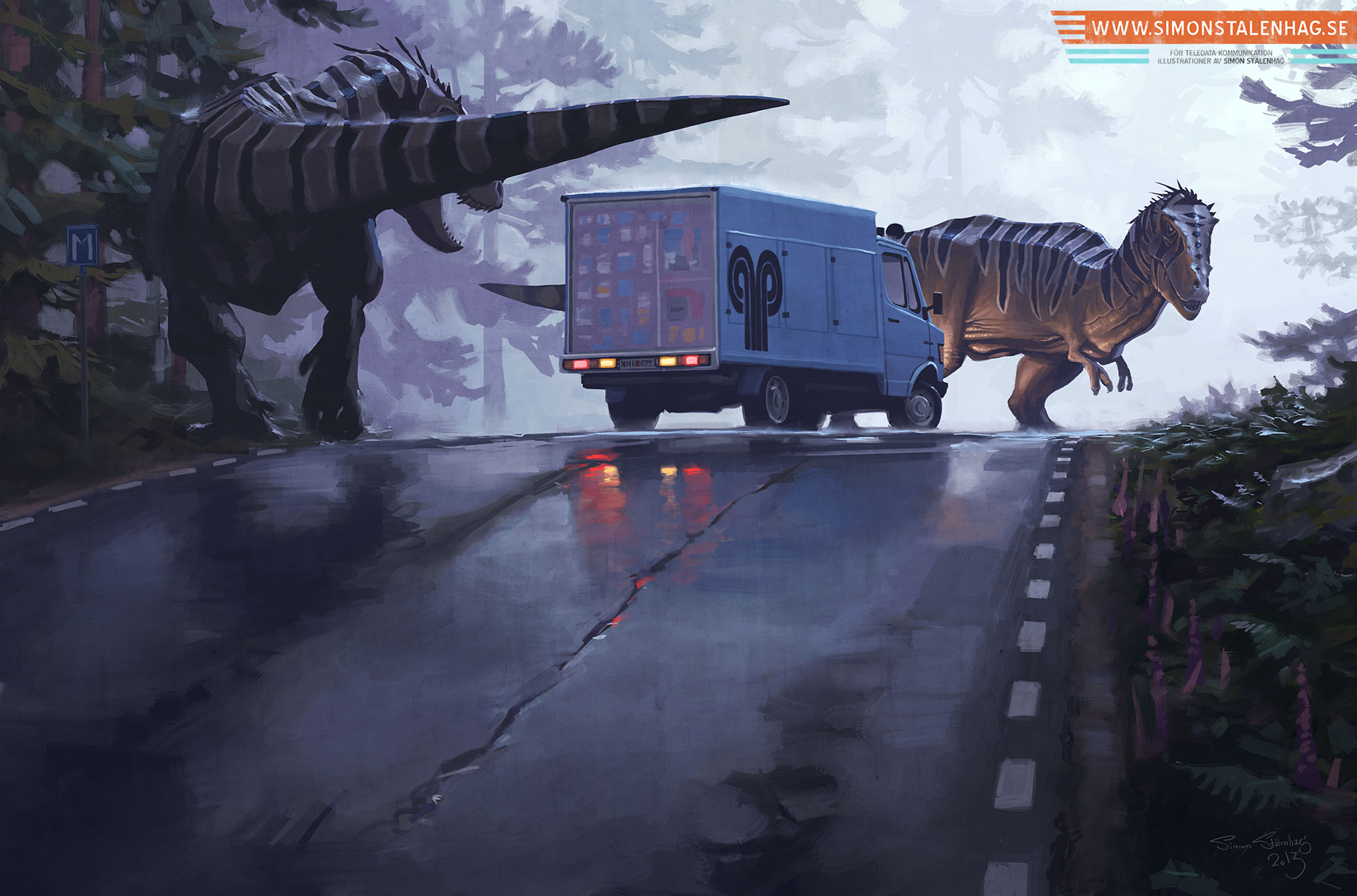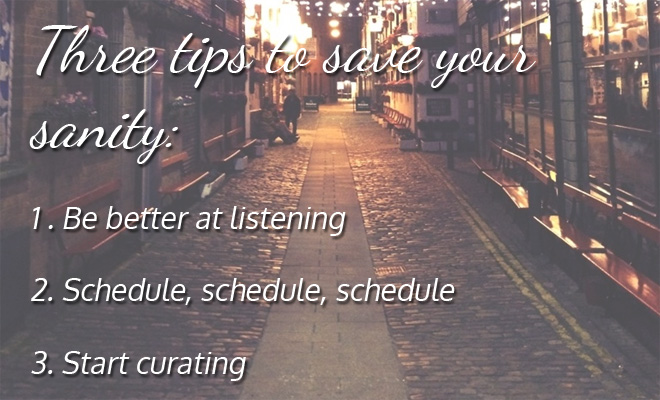Tagged: Marketing
Crowdfunding Crash Course: Nils Karlén - Simon Stålenhag's Tales from the Loop” & "Swedish Machines, Lonely Places
- by Alyson Shane

Nils Karlén runs Fria Ligan (Free League Publishing) and managed the Kickstarter for Swedish sci-fi artist Simon Stålenhag's two art books Tales from The Loop and Swedish Machines, Lonely Places.
Can you briefly describe Simon Stålenhag's “Tales from the Loop” & "Swedish Machines, Lonely Places"?
Simon Stålenhag’s digital paintings of Sweden in the 80’s and 90’s mixes science fiction with realistic landscape scenery. His work has been very popular on the Internet and he has been featured and interviewed by Wired, The Guardian and The Verge among others.
I run a small publishing company called Free League Publishing (or Fria Ligan in Swedish) together with some friends and when we first saw Simon’s paintings we fell in love with the mix of sci-fi and the “Swedishness” of the paintings. A friend came up with the idea that we should work together which we thought was a brilliant idea. So we approached him about making an art book together and had a few drinks when we discoverad that we all liked the same John Carpenter movies from the 80’s. Done deal!
The art book “Ur varselklotet” was published last autumn in Sweden and got an overwhelmingly good response. Two print runs later, and a lot of orders from across the world we realized that we had to do an English version as well. As Simon was well ahead with paintings for a second book, we decided it was just as well to crowdfund two books at the same time!

Why did you feel that the crowdfunding model was the best way to promote the books?
It was a natural fit. In part because we knew that Simon already had an enthusiastic fanbase (his Tumblr page has a lot of followers), and partly because we already had done two very succesfull crowdfunding campaigns for our games in Sweden. Also, we knew there was a demand for art books with his paintings as we had received loads of requests from all parts of the world.
Why and how did you choose Kickstarter over other crowdfunding options available?
It was an easy decision. We have previously run two campaigns using the Swedish Fundedbyme for the first and Indiegogo for the second. We really liked Indiegogo and it has a large following in Europe, however when it comes to the US, Kickstarter really is king. So it was natural to choose Kickstarter for this project, and I think the campaigns progress really shows the strength of the platform.
How far along was your project before you felt ready to launch a crowdfunding campaign? In hindsight, would you have preferred to be farther along, or to have crowdfunded earlier?
We are kickstarting two books, the first one was already translated and ready to go more or less. The second one is still in development and as Simon produces maybe one painting a week we are looking at publishing it during 2016. From the perspective of the crowdfunding campaign it would obviously be better if we could deliver both books at the same time, to save shipping costs if nothing more. However, I think it’s really good to be able to deliver something rather quickly, and the first book will be that something!

Can you explain how you prepared for and managed your campaign?
We did have some experience as we had run crowdfunding campaigns in Sweden previously so we the basics covered. However Kickstarter was unknown territory for us so we did do quite a bit of research beforehand. We read articles, looked at some successful campaigns and tried to find common denominators and so on. For instance I learned that having a very low first pledge level (a single dollar or so) is important to get the campaign moving as Kickstarters metrics considers every pledge, big or small. Also early bird pledges was something we picked up during this phase.
Managing the campaign is more about providing good customer service by responding to backer questions promptly and posting regular updates of the progress of the campaign. Also I think it’s very important to listen to the feedback that you inevitable will get from the backers.
What tools did you use to market your campaign? Do you feel like you did so successfully, and if not, what could you have done differently?
We used our own Facebook and twitter accounts to spread the world, but really what made the difference was that Simon himself used his twitter, web page and especially his Tumblr page to market the campaign. We also had a list of international media that we contacted after the launch of the campaign, but initially this met with mixed success as I guess our press release drowned in the mix. However, we got lucky when The Verge featured our project on the first day of the project and word of mouth started to get going, especially through twitter. Since then it has just been snowballing along!
In retrospect what were your best assets for running this successful campaign? On the other hand, what would you do differently?
To be honest our biggest asset was Simon’s paintings. Having beautiful and eye-catching imagery in the campaign cannot be underestimated I think.
The biggest mistake we did was that we did not realize that as a backer you can only choose one pledge level. As we kickstarted two books and had a lot of different levels with just one of the books this proved to be a challenge to handle. It did work out great in the end as we helped backers as much as possible so that they could get both books in the edition they wanted but this one one area where our research did not prove enough.
What was your biggest challenge during your campaign?
To be honest we were taken by surprise the initial success and struggled a bit to provide enough stretch goals to the campaign, so I would definitely say that was our biggest challenge.
What’s the most valuable advice you could share with aspiring crowdfunders?
Do your homework, prepare for success and plan for – if not failure but an uphill struggle. Make sure you got a good set of stretch goals planned and at least an idea of another set if you need to add ones quickly. Also: communicate all the time!
This post is part of the #CrowdfundingCrashCourse series. You can find the entire series of interviews and summary posts here.
The Issue with Instagram
- by Alyson Shane

Instagram has a problem with it's sharing settings that the developers seem unwilling to fix, and could be considered a security issue.
Some backstory: I manage a few social media accounts in addition to my own personal account, one of which is a client's Instagram account.
If any of you manage multiple Instagram accounts then you know that the app isn't designed with this use in mind: in order to switch between multiple accounts you have to sign out of one and sign in to the other each time you want to switch, which is a huge hassle.
But this post isn't about what a pain it is to switch accounts, it's about a more glaring and potentially embarrassing issue.
When I switch between accounts, Instagram keeps the linked Facebook and Twitter accounts from the previous login. What that means is that when I post something to my Instagram feed it gets shared to my client's account instead, even though I'm completely logged out of that account.
This has gone both ways: I've had their account post to my social feeds, and vice-versa and nothing I do is fixing this issue.
I've tried resetting the linked accounts multiple times on both profiles.
I've tried writing to Instagram (twice now) with no response or bug fix.
I've posted about it on /r/Instagram asking for help/advice with no luck. Nobody seems willing to acknowledge or fix it.
This is a huge issue with their security settings. What this means is that once you’ve logged in with one account, if you or someone else using your phone later logs into their own account, they can effectively post on your behalf to your Facebook and Twitter, without you knowing and bypassing any account protection.
I love using Instagram, and it's my most heavily-used photo-sharing app. The added bonus of an additional community to engage with is great, and the ability to cross-post across multiple accounts is a huge time-saver.
However, the fact that there has been an ongoing security issue that hasn't been resolved really worries me, and it makes me wonder how many other people out there are experiencing a similar issue.
I'm at the point, now, where I've notified my clients that I won't be using their Instagram account for the foreseeable future, and am considering simply moving to another photo-sharing platform like Tumblr instead, so this may not even be something that I have to worry about for much longer.
But if you use more than one Instagram account for anything, I'd double-check those linked account settings if I were you.
3 Tips to Run Multiple Social Media Profiles Without Losing Your Mind
- by Alyson Shane
Yesterday I was in a meeting where I was discussing how I manage multiple social media profiles, and the question that kept coming up was "how do you manage your time? Isn't it super time-consuming to manage all that information for multiple profiles at once?"
Honestly? It doesn't have to be!
Which leads me to this post. I want to share a few tips and tricks I've picked up to help make running multiple social media profiles a total breeze:

1. Maximize Your Listening
More and more people are taking to online spaces to share their thoughts online, and it's expected that brands and businesses are listening.
The vast majority of people expect a response to a Tweet in under 60 minutes, and as more brands take notice and start replying in a timely manner, that puts pressure on people like me to make sure that we're on the ball, as well.
What you can do:
Check your direct mentions on all social channels. You can set up email notifications or push notifications if you'd like, but these can be unreliable (Facebook, I find, is especially bad at 'forgetting' to do this) so the best way to manage this is to be logged in to each platform individually and manually check to see if someone has mentioned you or asked a question.
My favourite tool to manage this is Hootsuite, because it allows you to have multiple 'streams' of information open for every social profile that you manage.
2. Schedule Your Posts
This is so important. I wouldn't be able to do any of what I do if I wasn't able to schedule posts ahead of time.
Developing a content creation strategy is something that I'll discuss in a future post, but for now let's just stick with the basics: making sure that your content is scheduled to go out ahead of time will give you time to do things like respond to questions, direct messages, etc.
What you can do:
Again, my personal recommendation for this step is Hootsuite. I really love their desktop layout, and I have a column of scheduled tweets and posts that I can review at any time right in front of me along with the rest of my information.
However, don't go with Hootsuite just because I told you to! Some other really popular options are Buffer, Edgar and BundlePost. Do some research and figure out which works for you!
Protip: Scheduling content ahead at the beginning of the month is such an utter life-saver! I can't stress this enough: spend a few hours at the end of the month putting together your posts for the upcoming weeks and you'll save yourself a huge headache.
3. Curate Your Content
In addition to just sharing your own events and content and responding to messages, it's important to consistently share relevant content. Not only do you want to be an active presence online, but you want to be a "thought leader" as well.
This shows that you're at the forefront of the latest goings-on in your respective clients' industries - but how can you search for curated content in addition to keeping up with the needs of multiple profiles?
What you can do:
On Twitter, you can create a list of influential people in your industry, or people you want to connect with. Using these lists will ensure that you only see tweets from these sources, and can skim through them to see what they're sharing, and if it's relevant to re-share across your own networks.
Another great way to find content is by using a site like PopURLS, which shows the most popular content from several major online outlets, which you can narrow down by topics or sites of interest.
Hootsuite and Buffer also have 'content discovery' elements which will search through what's being highly-shared in your communities, which will give you some insight into what people are talking about and interested in at that particular moment.
Protip: Always read what you're sharing before sending it out! Never blindly share a link to a post without reading 100% of it.
Do you have any tips or tricks for managing multiple social media profiles? I'd love to hear them!
5 Questions to Ask Yourself About Your Marketing
- by Alyson Shane
The other day while out with my friend Kenton we got to discussing the freelance market, and how more and more businesses are turning to freelance content marketers to help them with their marketing needs.
One of my big takeaways from that conversation was that many business owners don't know when to start "letting go" of certain aspects of their business. As in, they spend way too much time doing (or neglecting) important things that they could simply outsource, even when it becomes detrimental to their business.

With that in mind, I figured I'd put together a short list of questions to ask yourself if you're a business owner who might be trying to shoulder too much of their business burden:
1. When did I last update my website?
While tools for building websites aren't in short supply, maintaining one which is accurate, up-to-date, compelling, mobile-friendly, and SEO-optimized requires more than just a landing page with a picture. A great website needs to do more than just look good - it needs to drive conversions like calls, emails, leads and customers, which includes ongoing investment in SEO content, structure and metadata.
Follow-up Questions:
- Do I want to spend time worrying about updating my website?
- Do I stress about creating engaging content?
- Am I strong enough writer to create content quickly and efficiently?
2. Do I want to keep up with SEO?
Staying up-to-date with the constant changes in Search Engine Optimization is among the most complex aspects of online marketing. It requires keeping tabs on which search engines people are using the most and ensuring that your website and web presence perform well on search-engine results pages after these updates.
Follow-up Questions:
- Does looking at SEO information make me go cross-eyed?
- Am I more interested in running my business than managing where it shows up on Google?
- Am I willing to spend the time to keep up-to-date with new SEO changes?
3. Am I getting results from my search engine advertising?
Techniques like Google AdWords can be one of the easiest and most cost-effective ways of generating new prospects, but if you've ever tried it you know that it requires much more than signing up, setting a text ad and waiting for the customers to roll in.
You need effective, compelling text that drives searchers to an optimized, relevant landing page, and a knowledge of your target audience so you're spending your money on driving visitors who are likely to buy from you. Understanding how to do this requires daily maintenance and analysis.
Follow-up Questions:
- Do I have the time to dedicate to analyzing and refining my campaigns to yield better results?
- Do I know what Google Pigeon is? Do I care?
4. Is my social media fan base my target audience?
You've signed up for a Facebook page and you've got a handful of 'Likes' - but what does that mean, exactly? Are you concerned in vanity numbers (aka, how many 'Likes' you have) or are you looking deeper at what sorts of people have shown an interest in your page?
How often are you looking at things like how many of your fans and followers are even in your immediate service area? How regularly are you updating your sites with relevant, interesting content that engages followers on your social media platforms? How are you leveraging paid advertising opportunities on these sites?
The key to successful content marketing is creating content that generates word-of-mouth and site traffic which boosts your website's SEO.
Follow-up Questions:
- Do I really know how to reach out to my target audience?
- Am I engaging with the right people?
5. Do I know my marketing ROI?
Anyone can pull together charts and graphs which show likes, follows and visitors to your site, but when you look at these numbers and figures, do you know how to make sense of the information there? Do you know how to translate this information into steps that will help your business grow?
Follow-up Questions:
- Do I want to look at daily, weekly, and monthly analytics to pull information from them and then apply them across all all of my marketing efforts?
- Does trying to make sense of my marketing efforts seem like more work than I want to do?
Do you recognize any of these signs as ones that indicate that you might need to start outsourcing your marketing? If not, do you think it's valuable to outsource your marketing? I'd love to know!
-----
Want to keep up with my posts about copywriting, social media and content marketing? Sign up for my newsletter and get them delivered right to your inbox!
How my 9-5 cured my blogging blues
- by admin
Yesterday I had one of the most interesting, challenging and unique days of my work experience so far: I sat down with the team at my office and participated in planning a year-long marketing strategy.
This was the first time that I was tasked with developing a long-term strategy for a client/employer, and while I'm thrilled to say that I rose to the occasion, preparing for it also ate up a ton of my free time and focus over the last little while. Beyond doing my community management and copywriting freelance stuff I barely had the time to get together with friends or have a night in to unwind.
I was drained for weeks.
So it was natural for me to expect that after 8 hours of planning, discussing, and planning some more, and finally setting a date for a follow-up meeting (yikes) that I would be feeling just as run-down and at a total lack for words as I've felt over the past little while.
Except I didn't. I felt great. And, for the first time in what feels like forever, I actually have words spilling from my fingertips so fast that I can barely keep up with them.
(which any writer will tell you is the best feeling imaginable)
As I sipped my wine in my bath yesterday, I started thinking about why this might have happened, and I realized that (gasp, shock, awe) my 9-5 actually cured me
It made me think outside of my comfort zone.
I work in a real estate office by day and since I've started we've been working on getting a total stylistic overhaul in place, as well as developing a long-term social media and content marketing plan. Because of the nature of the business (fast-paced, really intense) I had to really plan out a lot of moves in advance and focus on areas such as direct mail marketing in addition to the online stuff that I'm used to, so it really forced me to think outside of my comfort zone and make changes to what I normally think of "business as usual" tactics for marketing.
It forced me to focus.
#RealTalk time: these past 6 months have been a total whirlwind. I left a lover, fell head over heels with a charming-as-hell slice of a man, attended two festivals, camped, grew a garden, cycled all over the city, and moved house, all while working my regular 9-5 and managing my freelance clients. Needless to say it's been a bit crazy, and while I don't think I let my work slip in any way, I certainly felt pretty scattered and focusing on planning 2015 really helped me get centered and start pulling the pieces of myself back together.
It made my defend and discuss, and sometimes reconsider my decisions.
Most realtors brand themselves in a very similar fashion (if they brand themselves at all) and it was an interesting challenge to have to explain why things like blogging and Facebook engagement are worthwhile investments to someone who, while understanding that they are important, don't quite grasp the why of it. Something like content marketing seems like a given for me, but having to go in-depth as to why and how they would benefit the business, as well as presenting a long-term strategy which was challenged from multiple angles made me really have to think over why I wanted to shape our brand in a particular way. It was great practice, since I haven't had to do that for a while, and the feedback was immensely helpful in making sure that I was making the best possible decisions.
It made me work out more.
Sounds silly, but bear with me here: honestly, there were days where, after being at the office and doing freelance stuff at home, my brain felt so jumbled with stats and ideas and words that I just needed to get out, and I've started hitting the gym again on a regular basis. I write heaps more when I work out regularly (is there something about the treadmill that gets the creative juices flowing? Who knows.) and definitely feel significantly more inspired after hitting the gym after a day at the office.
It forced me to do a ton of research.
This is pretty self-explanatory: when you spend a bunch of time looking at, listening to, or discussing stuff that you love (in my case: copywriting, content management, social media, all that good stuff) it's hard not to want to start implementing all of the things you've learned right the f now. As a result I literally have a backlog of things that I want to blog about and share here, and it feels ah-maz-ing.
It reminded me that I'm totally capable.
We all have times when we start to feel down about ourselves, and while I was preparing for this huge meeting I had my fair share of "oh my god can I even get this together in a way that makes sense?!" moments. So when it call came together, smoothly and efficiently, it felt like this huge weight was lifted from my shoulders. I felt relief wash over me and I remembered that, heck yeah, I can totally rock this!
It made me want to take on more freelance work.
This kinda relates to the above point. After yesterday's meeting I felt totally inspired to get out there and do more of what I just finished doing -there's nothing like the feeling of successfully planning and implementing a huge project, is there? Anyway, now I'm ravenous for more clients! Not because I'm in this huge hurry to ditch my 9-5 -not at all!- But being able to explore new ideas and help this business grow makes me want to help other clients as well.
So (shameless plug) if you or anyone else know you know are looking for some copywriting or community management help, hit me up and let's chat!
It feels SO GOOD to be cured of my blogging blues!
What do you do to cure yours when you're feeling uninspired? I'd love to know!
Am I angry because of the Internet?
- by admin
Brian Fung at the Washington Post published an article stating that the Internet isn't making us dumb, it's making us angry.Which doesn't make me angry per se, but it definitely makes me think of the stuff I say and do online, and how it makes me feel afterward.
From the article:
In a study of 70 million posts on Sina Weibo, China's version of Twitter, Rui Fan and a team of others at Beihan University tracked the spread of joy, sadness, anger and disgust across the social network. According to the MIT Technology Review, they found that angry tweets were far more likely to be retweeted by others — or be the subject of angry responses — up to three degrees away from the original user.
Maybe things are different in China but if you tweet a bunch of negative shit you're getting an unfollow from me.

I don't think that it's the internet is making us angrier, it's that it gives generally negative people a soapbox to broadcast their negativity to everyone else, specifically when it comes to sites like 4chan, Reddit and etc where you have a fairly large degree of anonymity and because of that are able to to disregard regular social conventions and straight-up be a jerk to people.
That kind of behaviour and the negative tweets Fung refers to in his article aren't the products of the Internet, these people would be just as negative, destructive, horrible, disgusting, and whatnot regardless of whether or not the Internet existed. Their bad qualities would simply manifest themselves in a different way.
The one thing that the article neglects to mention is the fact that, before now, we didn't have a global public forum to express ourselves and there was no global public record of it before now.
We can't go back in time and see a timeline of what millions of peasants in the Dark Ages had to say. Though I'm sure it would sound something like this:
Johnny Cash died ten years ago today
- by admin
so let's take a second and listen to some real, quality music.
Sometimes in the wake of Miley Cyruses and Rebecca Blacks and whatever nonsense is being marketed to us because of it's shock value or horribleness or whatever
which ultimately distracts from anything important or relevant at all and are just tricks to make us feel superior to someone else
(because why else would we care, really, about something like this?)

it's nice to listen to music that gets you right down in your core
and makes you really feel something
right deep down in yr gut.
RIP Mr. Cash.
Guinness' new ad just earned them a loyal customer
- by admin
Now that's not to say that I haven't had Guinness before. I have.
In fact I'll pick it over a lot of other beers when my usual standby craft beers aren't available.
But their new ad struck a chord with me in a way that I can say no other beer commercial has done before.
Especially as a woman who, honestly, loves beer.
See, I've always taken issue with the image of the classic beer drinker: some super macho guy who loves sports and wears ball caps and dates cheerleaders.
Obviously I don't fit into any of those categories -I'm not a man, I don't like sports, I hate ball caps, I'm not a cheerleader... plus, I don't like men who like sports, wear ball caps and date cheerleaders. Those just aren't 'my' people.
They drink beer like me, but I've always felt removed from mainstream beer culture for those reasons -mainstream beer isn't "for" me.
But Guinness -which I consider to be a relatively 'mainstream' beer- really impressed me with their new commercial.
It's intense and moving. It shows people -men, specifically- being kind and considerate and genuinely good people. It shows them showing compassion for someone else.
Sure, there's some sports involved, but it doesn't feel like the same 'HURR HURR FOOTBALL' usually associated with beer commercials. It feels genuine.
The first few seconds are really intense and emotional, and when everyone gets up out of their wheelchairs and you realize that it's a bunch of dudes doing it for the benefit of their friend it just breaks your heart in this unspeakably wonderful way.
In particular I like the phrase they chose to use at the end of the commercial:
"The choices we make reveal the true nature of our character"
because means so much more than just what we choose to drink at the bar.
Well done, Guinness. You've come out with a thoughtful, touching and elegant advertisement for your product and you've earned yourself a lifelong supporter.
Why I want to fly Air New Zealand:
- by admin
the Rico campaign.Rico is a globe-trotting puppet who promotes their series of international seating arrangements through a series of off-colour jokes and dirty double-entendres which push the limits of what can be implied in a television commercial. He's also featured prominently on their YouTube page.
I won't lie, I found Rico by way of Air New Zealand's The Inseperable Sheep commercial which features David Hasselhoff doing... weird David Hasselhoff-type stuff that makes you feel kind of uneasy (which is what makes it great)
but I love, love, love the Rico campaign.
At times it's eye-yolling bad and at others it's so borderline crass you wonder how it manages to make its way onto TV. They have him being obsessed with Kim Kardashian and even made a special Valentine's Day message to her.
He also interviews celebrities on The Skycouch
makes rap videos with Snoop Dogg
and wrote a fake book called "Beating off the Track"
what I love about this campaign is that it shows that the airline is willing to take some risks with its image in order to stand apart in an otherwise (let's face it) pretty bland market. It also implies that Kiwis don't take themselves too seriously and that Air New Zealand is a 'fun' airline which will be a unique experience.
usually I think puppets are weird and creepy, and even though Rico is a weird and creepy puppet, he isn't a typical 'airline mascot' in the boring, normal sense. let's face it, marketing something like a seat on an airline isn't the most enthralling campaign, but Air New Zealand hit the ball out of the park on this one.
not to mention Rico gives some pretty sweet advice.
Alyson vs Pom Wonderful
- by admin
The insanity that is MEME begins tonight! I'll be at Whiskey Dix all night tweeting the event, come down and say hello, and buy me a drink while you're at it ;)

